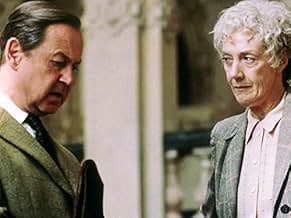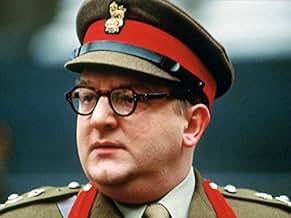IMDb रेटिंग
7.5/10
563
आपकी रेटिंग
अपनी भाषा में प्लॉट जोड़ेंAnthony Powell's twelve volume novel sequence "A Dance to the Music of Time" has been dramatized for television.Anthony Powell's twelve volume novel sequence "A Dance to the Music of Time" has been dramatized for television.Anthony Powell's twelve volume novel sequence "A Dance to the Music of Time" has been dramatized for television.
- 1 BAFTA अवार्ड जीते गए
- 3 जीत और कुल 5 नामांकन
एपिसोड ब्राउज़ करें
फ़ीचर्ड समीक्षाएं
A 1997 BBC adaptation of the seemingly endless cycle of novels by Anthony Powell. Essentially it is about a group of privileged, upper middle class literary types, who manage to coast through life without seeming to do very much at all, with a couple of notable exceptions. Despite this, it's totally compelling, particularly the episode that is set in World War Two.
Anthony Powell was well placed in the literary and party scene of the 1930s, and many of the characters are based on people he knew during his life and career, literary and military. The Anthony Powell Society has a fascinating page detailing the real life inspirations for many of his characters.
A degree of tolerance, along with a suspension of disbelief, is required to enjoy the final instalment, although it actually improves after the first viewing. The principal character Nick Jenkins (based on Powell himself) had hitherto been played by James Purefoy, but Jenkins was recast with John Standing for the final episode. This could be a little disconcerting at first, particularly as James Purefoy had created such a likeable character, and had anchored the narrative of the first three episodes. Some of the other essential characters - ones that weren't recast - tended to age at their own rate, regardless of the timeline. JG Quiggin (Adrian Scarborough) and Kenneth Widmerpool (Simon Russell Beale) seemed to age about half century in the decade or so after the war, whereas Pamela Flitton (Miranda Richardson) barely developed a grey hair. The makeup, now far more obvious with HD television, was not good at all, particularly on the standout character, Widmerpool, otherwise played superbly all the way through by Simon Russell Beale.
Despite these flaws in the final episode, this remains one of my favourite dramas of all time, largely because the actors bring the characters to life so beautifully.
Anthony Powell was well placed in the literary and party scene of the 1930s, and many of the characters are based on people he knew during his life and career, literary and military. The Anthony Powell Society has a fascinating page detailing the real life inspirations for many of his characters.
A degree of tolerance, along with a suspension of disbelief, is required to enjoy the final instalment, although it actually improves after the first viewing. The principal character Nick Jenkins (based on Powell himself) had hitherto been played by James Purefoy, but Jenkins was recast with John Standing for the final episode. This could be a little disconcerting at first, particularly as James Purefoy had created such a likeable character, and had anchored the narrative of the first three episodes. Some of the other essential characters - ones that weren't recast - tended to age at their own rate, regardless of the timeline. JG Quiggin (Adrian Scarborough) and Kenneth Widmerpool (Simon Russell Beale) seemed to age about half century in the decade or so after the war, whereas Pamela Flitton (Miranda Richardson) barely developed a grey hair. The makeup, now far more obvious with HD television, was not good at all, particularly on the standout character, Widmerpool, otherwise played superbly all the way through by Simon Russell Beale.
Despite these flaws in the final episode, this remains one of my favourite dramas of all time, largely because the actors bring the characters to life so beautifully.
It's possibly a bit late to post this question but as I have only now managed to see the video, here goes anyway. Does anyone know WHY it was deemed necessary to replace James Purefoy and Emma Fielding as Nicholas Jenkins and his wife in the last film of the series? Most of the other characters were left to age, convincingly or otherwise, even Widmerpool himself. Though Joanna David did at least bear a tolerable resemblance to how Isobel (Fielding) might have looked in later life, John Standing, excellent actor though he is, didn't look remotely like an aged James Purefoy. The changeover broke the continuum of events for me and was a constant source of irritation. What was behind this strange, irrational decision?
They don't make adaptations like this any more - no doubt for cost reasons and a lack of imagination and bravery at the TV companies. 7 hours of solid drama, yet full of incidental humour and some very fine characterisations.
Unfortunately it is flawed, and the flaws make it just very good viewing rather than the excellent series it should have been. The biggest flaws to my mind are:
1 The decision to replace Nick and his wife by new actors for Film 4 was totally wrong. Nick ages far too much in too short a space of time, and looks completely different. This creates a real problem of believability.
2 Still on ageing, some of the actors are 'aged' very well, whilst others (especially the ladies and Odo) seem hardly any different as the decades progress.
3 Film 4 is by far the weakest, though to be fair this reflects the books on which it is based. Perhaps it should have been cut further and the earlier years given even greater prominence.
4 Despite a great deal of pruning, there are still too many characters and insufficient narration for non-aficionados of the books to be sure all the time of who is who.
5 The scenes often seem to be a succession of dramatic deaths - difficult to avoid with the way the story has to be condensed, but very predictable nonetheless.
However, it's still pretty good, and light years removed from much of the dumbed-down drama on TV today.
Unfortunately it is flawed, and the flaws make it just very good viewing rather than the excellent series it should have been. The biggest flaws to my mind are:
1 The decision to replace Nick and his wife by new actors for Film 4 was totally wrong. Nick ages far too much in too short a space of time, and looks completely different. This creates a real problem of believability.
2 Still on ageing, some of the actors are 'aged' very well, whilst others (especially the ladies and Odo) seem hardly any different as the decades progress.
3 Film 4 is by far the weakest, though to be fair this reflects the books on which it is based. Perhaps it should have been cut further and the earlier years given even greater prominence.
4 Despite a great deal of pruning, there are still too many characters and insufficient narration for non-aficionados of the books to be sure all the time of who is who.
5 The scenes often seem to be a succession of dramatic deaths - difficult to avoid with the way the story has to be condensed, but very predictable nonetheless.
However, it's still pretty good, and light years removed from much of the dumbed-down drama on TV today.
Though nothing can compare with the books this is quite a fine stab, studded with the finest English talent of its period sensitively cast, and moderately faithful to significant portions of the books. The narrator's voice and perspective are well maintained though oddly James Purefoy is replaced by an excellent but jarring John Standing in the last episode while most of the other actors are cosmetically aged with varying degrees of success. Simon Russell Beale excels but does not dominate as the repulsive Widmerpool and the female characters live as they don't always in the books where they are seen through men's eyes. The music is well chosen and used from Coward's "Twentieth Century Blues" onwards and the use of visual art, including the eponymous Dance is apt.
I have to disagree with Mary Smith from America who said that this series was better than Brideshead Revisited. A Dance to the Music of time is almost completely devoid of any charismatic or otherwise engaging characters, with the exception of the likeable Stringham and the repulsive Widmerpool. It gestures towards Brideshead far too obviously (perhaps this was inevitable given the subject matter and the era) and in a way that only demonstrates its relative inferiority. The dialogue and direction are far too stagey, with the result that the character's words just don't ring true. Moreover I felt no concern for any of the characters: they wander aimlessly through their lives and we are offered nothing more than disconnected snapshots to develop our interest. There seems to be no analysis of or motivation for any of their actions: one character kisses another, some people get married, some divorce and some die. There is little by way of analysis: we "see" a lot, but understand (or care for) little of what goes on.
I confess that I enjoyed this series in parts. The costumes really are very good and the better actors do try valiantly with this stilted and sterile script. But it really is almost embarrassing compared to the infinitely superior Brideshead. Apart from a few entertaining scenes involving people dying at parties, and a rather enthusiastic display of nudity in the early scenes, this mini-series is really only for those who have read the books, and even then only as a curiosity piece.
Perhaps I have come to expect too much of British mini-series after being spoilt by productions such as Brideshead Revisited, Martin Chuzzlewit and Pride and Prejudice. Nonetheless, A Dance to the Music of Time is a barely entertaining, wasted opportunity.
I confess that I enjoyed this series in parts. The costumes really are very good and the better actors do try valiantly with this stilted and sterile script. But it really is almost embarrassing compared to the infinitely superior Brideshead. Apart from a few entertaining scenes involving people dying at parties, and a rather enthusiastic display of nudity in the early scenes, this mini-series is really only for those who have read the books, and even then only as a curiosity piece.
Perhaps I have come to expect too much of British mini-series after being spoilt by productions such as Brideshead Revisited, Martin Chuzzlewit and Pride and Prejudice. Nonetheless, A Dance to the Music of Time is a barely entertaining, wasted opportunity.
क्या आपको पता है
- गूफ़In the final segment, when Widmerpool is kissing the feet of the disciples, the edge of his phony hairpiece is clearly visible on the back of his head.
टॉप पसंद
रेटिंग देने के लिए साइन-इन करें और वैयक्तिकृत सुझावों के लिए वॉचलिस्ट करें
- How many seasons does A Dance to the Music of Time have?Alexa द्वारा संचालित
विवरण
- रिलीज़ की तारीख़
- कंट्री ऑफ़ ओरिजिन
- भाषा
- इस रूप में भी जाना जाता है
- Una danza para la música del tiempo
- फ़िल्माने की जगहें
- उत्पादन कंपनियां
- IMDbPro पर और कंपनी क्रेडिट देखें
इस पेज में योगदान दें
किसी बदलाव का सुझाव दें या अनुपलब्ध कॉन्टेंट जोड़ें











































